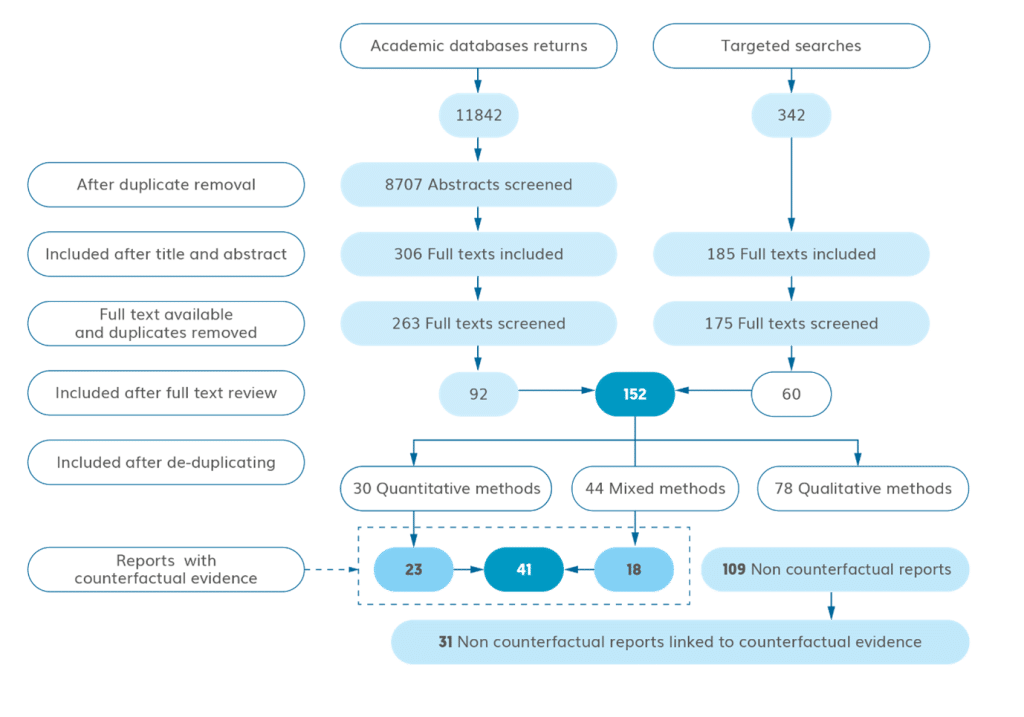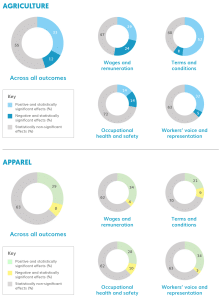Driving decent work in supply chains: insights from a new systematic evidence review
This month, the EU Parliament passed the long-awaited Corporate Sustainability Due Diligence Directive (CSDDD) and approved the proposed EU Forced Labour Regulation that will ban products made with forced labour from being sold anywhere in the EU. These are the latest additions to a slate of government policies aimed at tightening business accountability towards human rights and decent work. The hope is that such mandatory measures force companies across the globe to pull up their socks on demanding and driving decent work in their supply chains.
Voluntary supply chain tools such as sustainability standards, codes of conduct and multistakeholder platforms have also had a strong focus on driving decent work and wages in supply chains and been in operation for several decades. Understanding the impacts of such tools is essential to make them more effective and guide how voluntary and mandatory measures can work in tandem to achieve decent work.
This is the goal of a new systematic review study published by Evidensia, in partnership with ISEAL, IDH, and Rainforest Alliance. With a focus on agriculture and apparel sectors, the review looks at the existing evidence on the impact of voluntary sustainability standards, company sustainability codes, and multi-stakeholder platforms on a range of topics linked to decent work including wages and remuneration, occupational health and safety terms and conditions of work and worker empowerment.
Why a review on voluntary tools and decent work?
Decent work deficits in the agriculture and apparel sectors – such as low wages, occupational hazards or lack of job security – are linked to structural features of markets and production networks. Beyond poor wages and working conditions, agricultural labour regimes in Low or Middle-Income Countries are characterised by casual and seasonal wage labour, with a lack of formalised arrangements. In apparel, harsh working conditions are primarily a result of tight supplier margins driven by stiff competition and the power of global buyers.
Over the last three decades, a range of voluntary initiatives have emerged to address decent work deficits in global supply chains – initiated by companies, civil society organisations, standard-setting schemes and business platforms. However, few efforts have been made to date to systematically review evidence on the effectiveness of these initiatives. This review sought to address this knowledge gap.
The review focused on two questions:
1. What are the effects of corporate sustainability and multi-stakeholder approaches on decent work outcomes? (The “effectiveness” question)
2. How effective are corporate sustainability and multi-stakeholder approaches at adopting and implementing the decent work goals they set, across contexts and sectors? (The adoption and implementation question)
What evidence is there and where are there gaps?
Our systematic search yielded a total of forty one (41) studies providing quantitative evidence to understand effects and impacts of such voluntary tools. These were studies with robust impact evaluation designs that used a counterfactual approach to control for selection bias and confounding factors. We also reviewed an additional thirty one studies (31) studies that provided qualitative insight to analyse evidence on implementation, contextual dynamics and causal mechanisms.

Key findings from our systematic evidence search and mapping:
– A disproportionate share of evidence focusses on a few voluntary programmes. In apparel these are the Better Work Programme and the post-Rana Plaza reforms such as the Accord and Alliance. In agriculture these are Fairtrade and Rainforest Alliance certification programmes.
– Little to no evidence on widely used and significant programmes such as GLOBAL G.A.P. or Roundtable for Sustainable Palm Oil in agriculture, Global Framework Agreements in apparel or multistakeholder platforms such as company-focussed pre-competitive collaborations in living wages, forced labour and so on.
– On commodities, coffee is the most studied commodity, followed by banana plantation production, tea, cocoa and horticulture.
– In terms of geographical focus, apparel production in Asian countries and agriculture production in African countries have received more attention.
– Key knowledge gaps in this field are around flower production in South America; tea production in Asia, or entire value chains globally, such as palm oil, sugar, or wine. For the apparel sector we found no counterfactual evidence for African countries, nor traditional maquiladora countries such as Mexico and Honduras.
How effective are voluntary supply chain tools at driving decent work in supply chains?

Percentage of effects extracted per sector based on statistical significance
With the limits to the evidence base noted, our review does provide important insights on where voluntary tools are driving decent work and where impacts are unclear. At the outset, our analysis of robust statistical results shows that reported effects are dispersed across a wide range of decent work issues – from wages, to job security and other work terms and conditions, workers’ representation and occupational health and safety. This prevents us from identifying more general patterns and drawing strong conclusions about specific issues in depth. Our review also found that 55% of reported effects for agriculture and 63% for apparel are statistically non-significant. This means researchers could not establish a causal relationship between effects and intervention, suggesting, overall, limited effectiveness on issues such as wages, occupational health and safety and workers’ representation.
Key insights on effectiveness of voluntary supply chain tools on decent work:
– Around one third of reported effects for both agriculture and apparel are positive and statistically significant, meaning that there is some evidence of positive impact of supply chain sustainability approaches on decent work outcomes, particularly on terms and conditions in agriculture, and workers’ voice and representation across both sectors.
– The largest volume of reported effects is found for the topic of Terms and Conditions of work. It has a high share of positive effects for agriculture but a large share of no-effects in apparel, painting a mixed picture.
– Wages do not seem to be positively affected by voluntary supply chain interventions in both sectors, and there is a concerning high share of negative effects in agriculture (24%). This may be driven by interventions designed to primarily respect minimum wages, but not to directly increase wages compared to alternatives, or to achieve living wages.
How do context, implementation and sector dynamics influence how effective voluntary tools can be?
Our review also provides some additional insight on how context and implementation dynamics affect the effectiveness and impacts that supply chain-based tools can have on decent work outcomes:
– The effectiveness of interventions is undermined by challenges in reaching the most vulnerable workers, especially workers hired by smallholder farmers or undocumented migrant workers.
– Multiple certification and auditing fatigue reduces effectiveness by promoting simplistic compliance behaviour that is not designed to address the root causes of the decent work deficit.
– A false image of (no) effectiveness can be created by systematic selection of over- or under-performing participants into programmes, exacerbated by limited quality and outreach of compliance audits.
– Engagement with established trade unions and national labour institutions is central to more sustained success across the different areas, especially workers’ representation and terms and conditions, given that their ad hoc substitutes suffer from deficits in effective representation of worker voice.
– Public governance and the state are crucial contextual factors, i.e. how minimum standards are legislated and enforced, thereby inducing supply chain players to more effective undertaking of measures to improve work conditions.
– Specific market and commodity dynamics often determine the pressures that employers face and how these are passed onto workers in contexts of reduced profitability.
Key recommendations emerging from this review
For voluntary standards and similar systems:
• Explore and tackle the main challenges of monitoring labour standards, particularly for smallholders in the agriculture sector.
• Adopt living wage campaigns and seek to go beyond minimum wage standards.
• Embed interventions that address working terms and conditions and workers’ representation in existing structures, such as trade unions and their mechanisms of collective action.
• Put pressure on governments to enact enforceable supply chain legislation that is conducive to decent work in both buying and producing countries.
• Consider the main drivers leading to poor working conditions in each sector to better understand the potential impact of micro-level interventions compared to broader global binding agreements.
• Assess the reliability and efficacy of audits on labour standards to drive improvement and move towards more comprehensive independent assessments.
For private sector practitioners (especially global buyers):
• Improve the sanctioning mechanisms for situations of non-compliance, such as linking non-compliance with orders from buyers.
• Engage with established trade union organisations rather than opting for management-led worker councils or committees.
• Promote collective bargaining at sector level to further strengthen the collective voice of workers.
• Commit to living wage pledges and go beyond the enforcement of basic minimum wages.
• Have an all-encompassing view of the supply chain by considering monitoring and enforcement of labour standards across sub-contractors. Alternatively, avoid sub-contracting by first-tier suppliers if labour standards cannot be monitored or enforced.
• Use evidence-based research and information to back up company pledges and claims of impact.
Tackling the decent work deficit: why not all good things go together
This review has led us to two main reflections. First, ‘decent work’ encompasses a wide range of issues that are challenging to tackle simultaneously. The reality of current economic and labour market dynamics is that not all good things go together. It may be possible to tackle some decent work issues, such as workers’ representation or occupational health and safety more easily than wages, job security, and other terms and conditions of employment. Trade-offs are unavoidable. Voluntary standards, the private sector, governments, unions and other civil society organizations may contribute to some improvements in decent work issues, but only to a limited extent if interventions are not far-reaching enough.
Second, labour regimes in agriculture and apparel are inherently exploitative – they produce job insecurity and low remuneration for workers. This stems from deeply rooted global and local market forces. Competition, insufficient protections, and limited collective action heavily influence how suppliers or producers treat their workers. A reality check is needed, as this review suggests. Voluntary standards and company-driven tools can drive change on some aspects of working conditions, but not at a systemic level.

